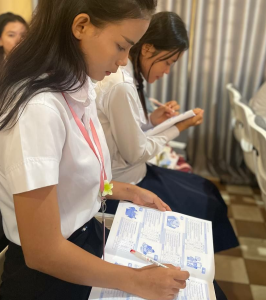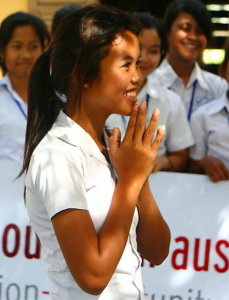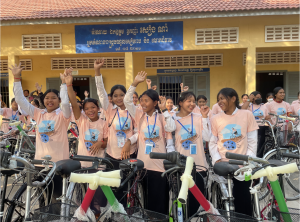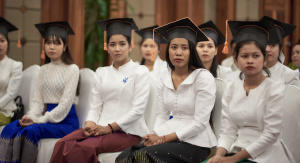Lotus Outreach operates programs in conjunction with Cambodian NGOs that are focused on education, vocational training and sustainability.
Girls Access To Education (GATE program)

The Girls Access to Education (GATE) program in Phnom Penh district is the prime responsibility of Lotus Outreach Australia. This program currently helps 100 – 150 Cambodian girls from very poor families to get an education. In addition to providing scholarships, uniforms, school books etc the girls receive health checks, and the Rice Support Program provides rice to the very poorest families. This encourages parents to allow their daughters to stay at school instead of having them go out to work to supply family income.
How the GATE program works
Lotus Outreach Australia (LOA) works with our In-Country partner Cambodian Women’s Crisis Centre (CWCC) who in turn work with Local Education Working Groups (LEWG) to identify girls most at risk in our target communities, offer them scholarships and help to keep them in school. CWCC and the LEWG then provide the crucial monitoring and regular meetings with students and their families that means that GATE girls attend school consistently and achieve good grades, and eventually graduate.
Working with the Community
LOA also works closely with its office in Phnom Penh (Lotus Outreach Cambodia, LOCAM). LOCAM and CWCC support the GATE program by running Community Education Sessions on Human Rights issues emphasising the value to families, communities and the country of educating girls: and the consequences of trafficking, domestic violence, and child rights. LOCAM and CWCC also run workshops on career guidance and vocational training, opening up possibilities of meaningful careers and work for the GATE graduates.
Real, positive outcomes

GATE girls whose families are illiterate are becoming the first high school graduates in their families. Mothers are coming forward to tell us how important schooling is for their daughters. Many of the girls are starting to see themselves in a new light – focusing on graduating, going on to further education and a good job, and in turn making sure that their future children will be educated and independent too. Sign up to our newsletter to receive regular updates on the progress of the girls in the program and hear stories from the girls LOA is supporting.
Lotus Pedals and Rice Support

Lack of transport prevents many girls getting to school. Some girls walk up to 8kms to school in the early dawn, or after dark, with a real risk of being assaulted or even kidnapped. Providing girls with a bicycle & repair kit reduces time travel time, so girls have more time to study.
Lotus Outreach Australia provides rice to the poorest of our scholarship students and their families each month. Rice support means girls don’t need to work to support their family, and can focus on their studies. Food for the family is often the crucial factor allowing a girl to stay in school and not drop out.
Catalyst

The Catalyst Program has been developed and implemented by Lotus Outreach Cambodia to help GATE scholarship graduates access university or vocational training. Catalyst runs regular workshops with GATE students to introduce them to all the options available to them. Catalyst also seeks out and develops vocational opportunities that suit the girls’ interests and needs. Girls in Catalyst are encouraged to ‘give back’ by helping their communities.